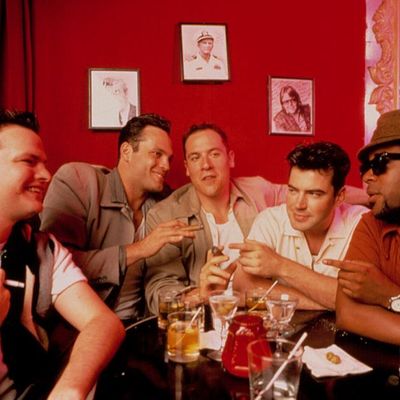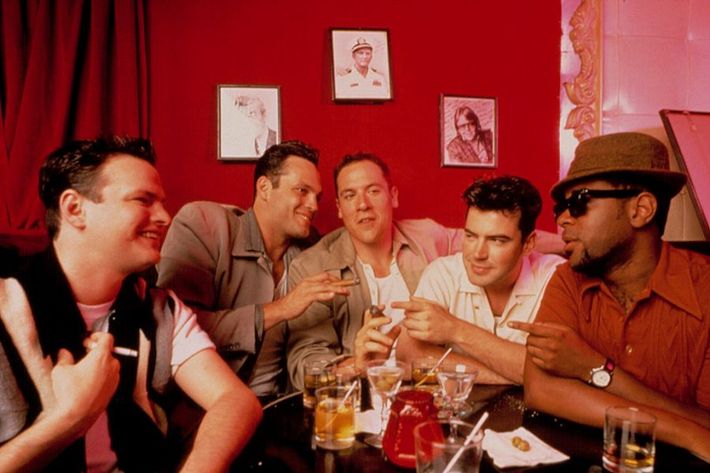

The Nostalgia Fact-Check is a recurring Vulture feature in which we revisit a seminal movie, TV show, or album that reflexively evinces an “Oh my God, that was the best ever!” response by a certain demographic, owing to it having been imprinted on them early. Now, years later, we will take a look at these classics in a more objective, unforgiving adult light: Are they really the best ever? How do they hold up now? We’ve already reconsidered Heathers, Ally McBeal, Ace of Base’s The Sign, Ghostbusters, Dinosaurs, the early work of Adam Sandler, and Coolio’s album Gangsta’s Paradise. Next up: Swingers.
Background: Like a prequel to Entourage (but way more tolerable), Swingers follows a group of struggling actors in Los Angeles who hang out, swing dance, bemoan the state of their careers, and try to get laid. The movie was released in 1996, and while it collected just under $5 million — a not-insignificant purse for a small Miramax indie, especially one that cost a meager $250,000 to make — it was even more valuable as a calling card for stars Vince Vaughn and Jon Favreau, as well as director Doug Liman.
Nostalgia Demo: If you’re a man in your thirties, you can quote nearly the entire screenplay. In the nineties, this was like Clueless for guys (which is not to say that it doesn’t have cross-gender appeal).
Nostalgia Fact-Check: When I was in high school, I thought that Swingers was my own random Blockbuster Video discovery, a potential Bible to my upcoming twenties that I could pass on to other guys as gospel. Then I got to college, where Swingers posters were sticky-taped onto every dorm wall, no VHS collection was complete without a copy of the movie, and Big Bad Voodoo Daddy was booked to play an orientation concert during the first week of school.
I mention this not only to suggest how quickly Swingers became a sensation on home video, but to prepare you for how fully intense the nostalgia blast is when you rewatch it. If you read that last paragraph and you were like, “Ha-ha, VHS tapes, Big Bad Voodoo Daddy, dorms,” then you are not ready to watch Swingers in 2011. It may crush you with how unexpectedly jam-packed every scene is with specific yet offhand period detail, like how the punch line to two separate scenes is someone pulling out The Club and affixing it to a steering wheel. And if you’re nostalgic for bygone eras of urban planning? Then forget it, you’ll be a wreck when you realize that the Derby where Favreau dances with Heather Graham is no longer with us (despite a “Save the Derby” campaign that doubtlessly drew participants who’d first seen the iconic club in Swingers) or notice that when Favreau and Vaughn head to Vegas, the grandest casino hotel in the arrival montage is the by-now-dinky Excalibur. It was a very different landscape in 1996.
There is one other thing I should prepare you for: Vince Vaughn is just so gorgeous in this movie, you guys. In his first shot, as Favreau chatters away at him in the passenger seat of Vaughn’s car, the lithe Vaughn is like a heavy-lidded male model sex bomb, uncharacteristically silent, a slight smile playing across his face. It is fucking attractive. There is one slight downside to his character, Trent, upon rewatch: With all his subtle negging and aggressively rule-based flirting, he comes across as an unfortunate progenitor to Mystery from The Pick-Up Artist. But for the most part, to revisit Swingers is to be struck dumb by the confident sexiness that was once Vaughn’s stock in trade.
Still, despite the nostalgia inherent in all the little details (like the Reservoir Dogs homage, or the Genesis ice-hockey game that Vaughn deviously unpauses while his friends are getting money for the Pink Dot deliveryman), Swingers still holds up well because its core story is so intimate. The time period and the Hollywood setting are just window dressing for a simple comedy about a guy who can’t get over his ex and the friends who try to get him back into the game. And that ending! It’s laudably modest: Though Favreau is encouraged by meeting Graham, the two never even kiss, and his victory is simply that she calls him the next day and seems excited about it. Then, to put a point on it, the movie ends with an epilogue where the now-peaceful Favreau looks on with amusement as Vaughn’s aggressive attempt to draw in another “baby” leads to a crash and burn. Sometimes you don’t need a hard sell, the movie tells us, when a soft touch will do just fine.
Five years later, Vaughn and Favreau reunited for Made; as he did with Swingers, Favreau wrote the screenplay, but this time he made his directorial debut. If it’s a spiritual sequel to Swingers, it’s an unhappy one that suggests that Favreau and Vaughn’s aspiring actors have made it into the Hollywood system, but have found themselves stymied by it. Favreau plays a boxer with a mixed record of five wins, five losses, and one draw (that Favreau had acted in eleven films before Made implies an extratextual reading of that record), who works for the mafia in Los Angeles but still tries to hang on to his inherent goodness. Meanwhile, Vaughn’s character is such an amped-up parody of Trent from Swingers that it suggests a desperate, disgusted attempt to return to that well after six years of mixed success in movies like Psycho and Domestic Disturbance. (Five years later, he’d nail his comeback by flat-out reprising his sly best friend shtick for Wedding Crashers, this time without the self-laceration of his Made role.)
And then, if you look at the 2009 comedy Couples Retreat as the final installment of an unofficial Favreau-Vaughn trilogy — and perhaps you should, since Favreau and Vaughn co-wrote it and Favreau originally planned to direct — it suggests that their discontented duo from Made has finally learned to stop worrying and embrace the Hollywood mainstream. The crappy apartments, eclectic women, and dark bars of Swingers have been phased out in favor of bright island vacations and actresses who aspire to bare their hard abs on the cover of Self, and though Swingers and Couples Retreat both feature extended set pieces where the characters play video games, the Genesis ice-hockey game in the former feels like another true-to-life detail of their lives, while the inclusion of Guitar Hero in the latter smacks of lucrative product placement.
Favreau and Vaughn spend a lot of time in Swingers worrying about the future of their careers, and if there’s an extra, implicit ending to rewatching the movie, it comes from knowing just how big both of them would eventually become. (Indeed, when it comes to making huge tentpole movies, Favreau has now surpassed Liman, the director who helped give him his big break.) Still, that happy ending is bittersweet: Vaughn has gone on to become an A-list actor, but he hasn’t made a comedy that uses him better than Swingers, and while Favreau has directed some good movies, there’s something poignant about how he gets his best work out of Vaughn surrogates like the similarly fast-talking, improv-loving Robert Downey Jr. Success is a nice thing if you can get it, but Swingers is a potent reminder that all those misadventures before you make it in life can account for your purest, strongest, most important memories even fifteen years later. We’re all growns up now, but sometimes it’s good to go back.




